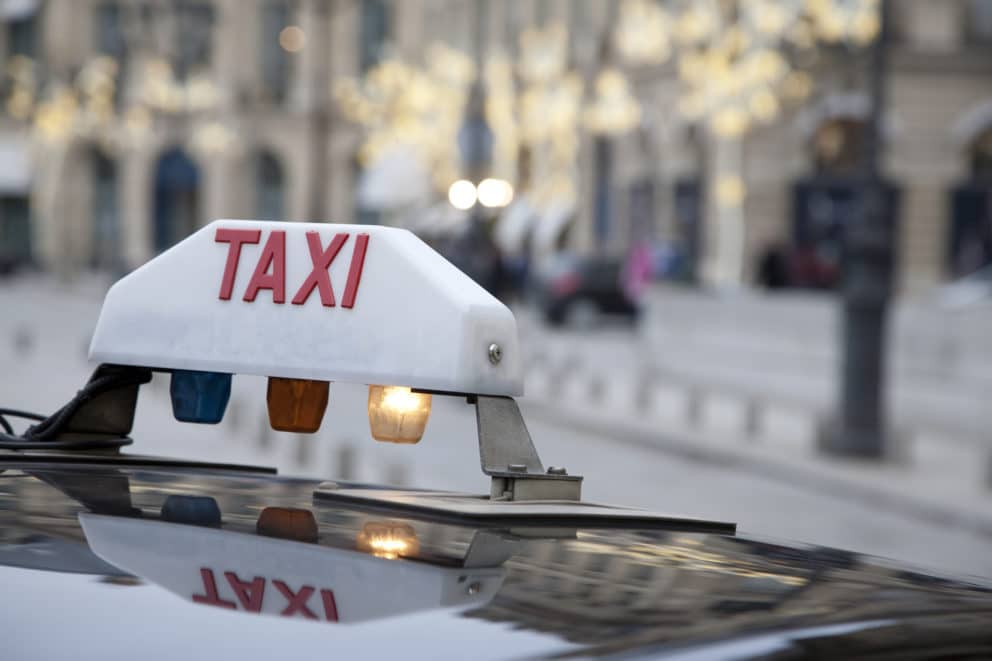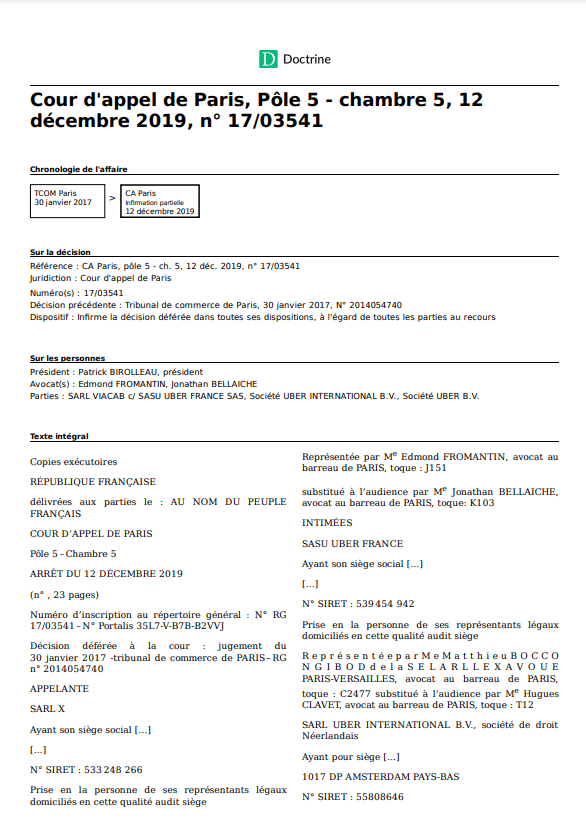

Object of the decision
In a landmark judgment dated December 12, 2019 in which GOLDWIN SOCIETE D’AVOCATS (Maître Jonathan BELLAICHE , Partner and Maître Olivia ZAHEDI , Counsel) represented a taxi reservation center, the Paris Court of Appeal ruled that:
– UBER operates a transportation service and not a connection platform
The Court’s reasons are as follows:
” However, the Court of Justice of the European Union, in its decision dated 10 April 2018, held that the “intermediation service in question must be considered as an integral part of an overall service, the principal element of which is a transport service, and, therefore, as meeting the classification (…) of a “service in the field of transport”, within the meaning of Article 2(2)(d) of Directive 2006/123″. It follows that the transport service is the principal service, so that the connection phase is only preparatory in nature, that the Uber companies are passenger transport operators and that they are in competition with the activity carried out by the company […]”.
The Paris Court of Appeal then rigorously applied the case law handed down by the Court of Justice of the European Union on 10 April 2018, recalling that the main service provided by UBER was indeed a transport service.
– The UBERPOP service is indeed illegal and must give rise to compensation for damages for T3P (private public transport of people) professionals.
The Court confirmed the case law already handed down by the Court of Cassation recognizing that the UBERPOP service was illegal.
The Court confirmed the right to compensation of T3P professionals who suffered damages as a result of the UBERPOP service.
This is neither more nor less than the application of case law already issued on the matter.
– Les dispositions prohibant la maraude électronique sont bien applicables en France et leur violation par UBER constitue de la concurrence déloyale.
La Cour d’Appel de Paris a jugé que la plateforme violait les dispositions du Code des transports qui interdisent à tous transporteurs autres que les taxis, la maraude sur la voie publique et le démarchage de clients sans réservation préalable, dont notamment :
– s’arrêter, stationner ou circuler sur la voie publique, à moins de justifier d’une réservation préalable et de ne pas revenir sur le lieu d’établissement ;
– informer le client, avant toute commande ou réservation, à la fois de la localisation et de la disponibilité du véhicule.
Pour rentrer en voie de condamnation, la Cour a constaté que :
“Aux termes de son Guide du partenaire, la plate-forme incite ses chauffeurs à « se répartir de manière homogène dans les zones de forte demande » pour espérer avoir davantage de courses (pièce n°5f, page 34) et permet aux chauffeurs de visualiser sur une carte, en temps réel, les zones géographiques dans lesquelles les demandes de réservations sont plus ou moins élevées (pièce n°5f, pages 17 et 34), encourageant dès lors un chauffeur ne disposant pas de réservation à se rendre dans une zone de forte demande afin de faire l’objet d’une réservation.Ces éléments établissent que les sociétés Uber, par les préconisations qu’elles délivrent à destination des chauffeurs de VTC, favorisent le non-respect des dispositions des articles L. 3120-2, II et L. 3122-9 du code des transports. Ces actes sont constitutifs d’une concurrence déloyale“.
“Il ressort du procès-verbal de constat d’huissier en date du 28 janvier 2016 versé aux débats par les sociétés Uber (pièce n°34) que :
– la carte apparaissant sur l’application Uber donne une information sur la localisation des véhicules de transport avec chauffeur ;
– le bandeau “commander ici”, qui s’affiche sur l’écran du smartphone, fait apparaître le temps d’attente pour la prise en charge du client (pièce n°34 – pages 9 à 35), information qui permet d’apprécier la disponibilité du véhicule le plus proche;
de sorte qu’en informant le client, préalablement à la réservation, à la fois de la localisation et de la disponibilité du véhicule, l’application permet la pratique de la maraude électronique, pratique prohibée par l’article L. 3120-2, III 1° du code des transports pour cette catégorie d’opérateurs. Cet élément est constitutif d’une concurrence déloyale “.
Cet arrêt confirme donc bien heureusement le monopole de maraude pour les taxis lesquels subissent nécessairement un préjudice du fait de la pratique de la maraude électronique et du non-retour à la base par les VTC.
– L’utilisation abusive du statut LOTI par UBER a enfin été reconnue et condamnée.
La Cour a jugé que :
” It also emerges from the documents submitted to the proceedings that Uber encouraged the use of capacity workers by disseminating information according to which, in order to “become an UberX or Berline driver”, one must have a “professional license (VTC professional card license and Atout France authorization or passenger transport capacity < 9 seats and license from the regional equipment directorate)” (documents […] no. 17a, pages 8 and 17b). Benefiting from simplified conditions of access to the status of driver compared to those applicable to taxi or VTC drivers, the “Loti” drivers necessarily provided a competitive advantage to the Uber companies. This element constitutes unfair competition .”
The misuse of LOTI status was one of the most significant competitive harms for T3P professionals, which was fortunately sanctioned.
– UBER drivers are not employees of the Commercial Chamber of the Court of Appeal.
The Court held that:
” None of the elements invoked could characterize the existence of a relationship of subordination between UBER and the drivers .”
The criteria used by the Social Chamber of the Paris Court of Appeal to recognize the qualification of UBER drivers as employees were submitted to the Court for its assessment.
With this ruling, the commercial chamber of the Paris Court of Appeal marks its divergence from the social chamber and allows the debate to be opened on the status of drivers with regard to the applicable rules.
The question of the legal qualification of UBER drivers is therefore subject to a double assessment between the social chamber and the commercial chamber, which fully reopens the debate on the matter.
Consequently, the Paris Court of Appeal, in its ruling:
– States that the UBER companies committed acts of unfair competition in the operation of the UBERPOP service, through the practice of electronic poaching and the use of drivers operating under the LOTI status
– Ordered the companies UBER FRANCE, UBER BV, and UBER INTERNATIONAL BV to stop encouraging drivers to drive on public roads in search of customers and to encourage drivers not to return to their base or to a location located off the roadway to await a reservation unless they can provide proof of another prior reservation
UBER FRANCE, UBER BV, and INTERNATIONAL BV were ordered to pay €106,000 in damages and €15,000 under Article 700 of the Code of Civil Procedure, in addition to costs.

